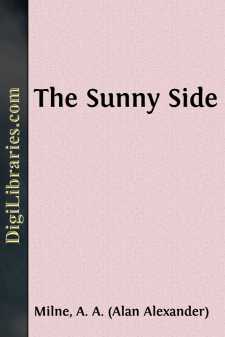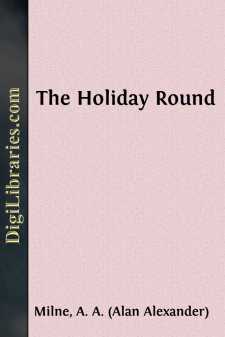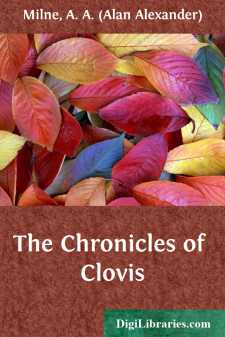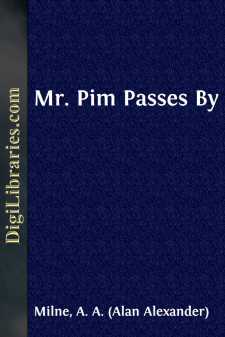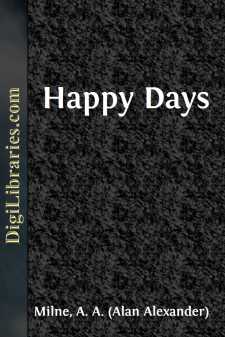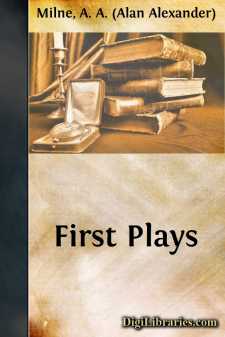Categories
- Antiques & Collectibles 13
- Architecture 36
- Art 48
- Bibles 22
- Biography & Autobiography 813
- Body, Mind & Spirit 142
- Business & Economics 28
- Children's Books 14
- Children's Fiction 11
- Computers 4
- Cooking 94
- Crafts & Hobbies 4
- Drama 346
- Education 46
- Family & Relationships 57
- Fiction 11829
- Games 19
- Gardening 17
- Health & Fitness 34
- History 1377
- House & Home 1
- Humor 147
- Juvenile Fiction 1873
- Juvenile Nonfiction 202
- Language Arts & Disciplines 88
- Law 16
- Literary Collections 686
- Literary Criticism 179
- Mathematics 13
- Medical 41
- Music 40
- Nature 179
- Non-Classifiable 1768
- Performing Arts 7
- Periodicals 1453
- Philosophy 64
- Photography 2
- Poetry 896
- Political Science 203
- Psychology 42
- Reference 154
- Religion 513
- Science 126
- Self-Help 84
- Social Science 81
- Sports & Recreation 34
- Study Aids 3
- Technology & Engineering 59
- Transportation 23
- Travel 463
- True Crime 29
A. A. (Alan Alexander) Milne
Alan Alexander Milne (1882-1956) was an English author best known for creating the beloved children's characters Winnie-the-Pooh and his friends in the Hundred Acre Wood. Originally a successful playwright and novelist, Milne's work for children, especially "Winnie-the-Pooh" (1926) and "The House at Pooh Corner" (1928), brought him enduring fame. His stories, inspired by his son Christopher Robin and his toys, have become timeless classics in children's literature.
Author's Books:
Sort by:
INTRODUCTION My publisher wants me to apologize for—"introduce" was the kindly word he used—this collection of articles and verses from Punch. I do so with pleasure. Among the many interests of a long and varied career— No, I don't think I shall begin like that. It was early in 1871— Nor like that. Really it is very difficult, you know. I wrote these things for a number of years,...
more...
CHAPTER I. Mrs. Stevens is Frightened In the drowsy heat of the summer afternoon the Red House was taking its siesta. There was a lazy murmur of bees in the flower-borders, a gentle cooing of pigeons in the tops of the elms. From distant lawns came the whir of a mowing-machine, that most restful of all country sounds; making ease the sweeter in that it is taken while others are working. It was the hour...
more...
I.—THE ORDEAL BY WATER "We will now bathe," said a voice at the back of my neck. I gave a grunt and went on with my dream. It was a jolly dream, and nobody got up early in it. "We will now bathe," repeated Archie. "Go away," I said distinctly. Archie sat down on my knees and put his damp towel on my face. "When my wife and I took this commodious residence for six...
more...
INTRODUCTION There are good things which we want to share with the world and good things which we want to keep to ourselves. The secret of our favourite restaurant, to take a case, is guarded jealously from all but a few intimates; the secret, to take a contrary case, of our infallible remedy for seasickness is thrust upon every traveller we meet, even if he be no more than a casual acquaintance about...
more...
INTRODUCTION Encouraged by the reviewer who announced that the Introduction to my previous collection of plays was the best part of the book, I venture to introduce this collection in a similar manner. But I shall be careful not to overdo it this time, in the hope that I may win from my critic some such tribute as, "Mr. Milne has certainly improved as a dramatist, in that his plays are now slightly...
more...
I.—HE INTRODUCES HIMSELF "In less refined circles than ours," I said to Myra, "your behaviour would be described as swank. Really, to judge from the airs you put on, you might be the child's mother." "He's jealous because he's not an aunt himself. Isn't he, ducksey darling?" "I do wish you wouldn't keep dragging the baby into the conversation; we...
more...
Act III Scene.–The same and furniture exactly as in Act II. (Mr. Pim is below settee L. standing in same position as at the end of Act II. George Marden is in centre of stage and Lady Marden is at foot of staircase. Their altitude is the same as at the end of Act II, and all are concerned about Olivia's hysteria.) George. Dead! Dead! Pim. Oh dear! Oh dear! I'm afraid I broke the news rather...
more...
IF I MAY The Case for the Artist By an “artist” I mean Shakespeare and Me and Bach and Myself and Velasquez and Phidias, and even You if you have ever written four lines on the sunset in somebody’s album, or modelled a Noah’s Ark for your little boy in plasticine. Perhaps we have not quite reached the heights where Shakespeare stands, but we are on his track. Shakespeare can be representative...
more...
MARGERY I When Margery was three months old I wrote a letter to her mother: Dear Madam,—If you have a copy in Class D at 1/10d. net, I shall be glad to hear from you.I am,The Baby's Uncle.On Tuesday I got an answer by the morning post: Dear Sir,—In reply to yours: How dare you insult my child? She is in Class A1, priceless and bought in by the owner. Four months old (and two days) on Christmas...
more...
INTRODUCTION These five plays were written, in the order in which they appear now, during the years 1916 and 1917. They would hardly have been written had it not been for the war, although only one of them is concerned with that subject. To his other responsibilities the Kaiser now adds this volume. For these plays were not the work of a professional writer, but the recreation of a (temporary)...
more...


